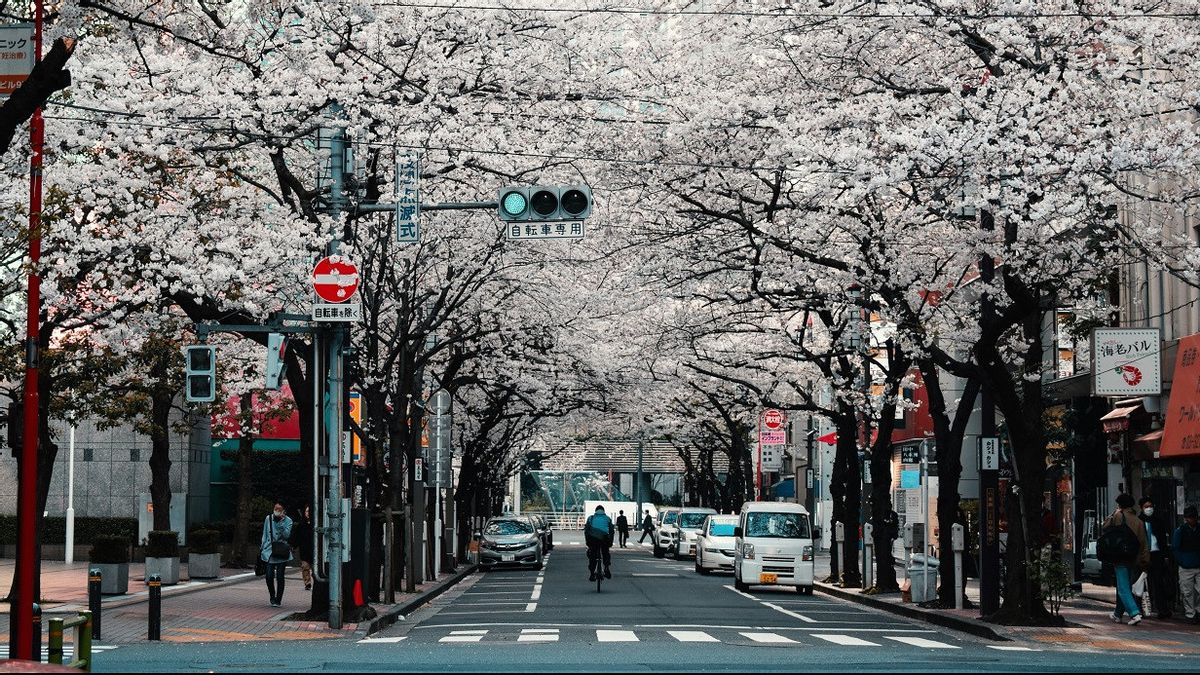JAKARTA - This year's cherry blossom season takes place in a short time. In fact, it is recorded as one of the earliest bloom cycles recorded. It looks ordinary, but scientists call this anomaly a larger climate crisis.
Yasuyuki Aono, a researcher at Osaka Prefectural University, had collected records from Kyoto in 812 AD from historical documents and diaries.
In downtown Kyoto, cherry blossoms peaked on March 26, the earliest in more than 1,200 years, Aono said. And in the capital Tokyo, cherry blossoms bloomed perfectly on March 22, the second earliest date on record.
"As global temperatures warm, freezing spring occurs early and flowering occurs faster," Dr. Lewis Ziska of Columbia University's Environmental Health Sciences, told CNN.
Peak bloom dates shift each year, depending on many factors including weather and rainfall, but have shown a general trend of moving earlier and earlier.

In Kyoto, peak dates ranged around mid-April for centuries, according to Aono data, but began moving into early April during the 1800s. The date has only dropped to the end of March several times in recorded history.
"Cherry blossoms are very sensitive to temperature. Flowering and full blooming can be earlier or later depending on temperature only. The temperature was low in the 1820s, but has increased by about 3.5 degrees Celsius (6.3 degrees Fahrenheit) to this day," explained Aono.
This year's season specifically affects bloom dates, he added. Winter is very cold, but spring comes quickly and is amazingly warm.
However, their initial development is just the tip of the iceberg of a world phenomenon that could destabilize the country's natural and economic systems, said Amos Tai, assistant professor of earth sciences at the University of China in Hong Kong.
There are two increasing heat sources, the main factors that make flowers bloom early, namely urbanization and climate change.

With increasing urbanization, the city tends to become warmer than the surrounding countryside, which is called the hot island effect. But, the bigger reason is climate change, which has led to rising temperatures throughout the region and the world.
Influence each otherAnd these early dates aren't just a matter of tourists scrambling to get peaks blooming before all their petals fall off. It could have a lasting impact on the entire ecosystem and threaten the survival of many species.
"Plants and insects rely heavily on each other, and both use environmental cues to time different stages of their life cycle," Tai said.
For example, plants feel the temperature around them and if it is warm enough for a consistent period, they begin to flower and the leaves begin to appear. Similarly, insects and other animals depend on temperature for their life cycle, which means higher heat can lead to faster growth.
"The relationship between plants and insects and other organisms has developed over the years, thousands to millions of years. But in the last century, climate change has completely ruined everything and disrupted all these relationships," Tai said.

Different plants and insects can respond to heat gain at different speeds, so their life cycle is out of sync. If they ever calculate the time of their growth simultaneously every spring, now the flowers may bloom before the insects are ready.
And on the contrary, it means insects may not find enough food to eat from plants, and plants do not have enough pollinators (to reproduce).
Over the past decade, some plant and animal populations have begun to shift to higher altitudes and higher latitudes, to avoid the effects of climate change, according to a 2009 study in Conservation Biology.
But it is getting harder for ecosystems to adapt, with climate change making the weather even more unpredictable. Although flowering date trends generally move earlier, unpredictable and extreme weather means there is still enormous variability year after year.
"Ecosystems are not used to large fluctuations, it causes them a lot of stress. Productivity may be reduced, and ecosystems may even collapse in the future," Thai concluded.
The English, Chinese, Japanese, Arabic, and French versions are automatically generated by the AI. So there may still be inaccuracies in translating, please always see Indonesian as our main language. (system supported by DigitalSiber.id)













